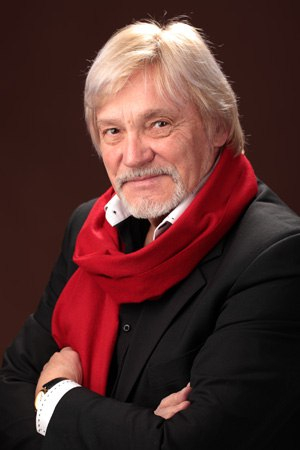
• People’s Artist of the USSR (1973)
• Winner of the World Festival of Youth and Students (Vienna, 1959; 1st prize) and the International Ballet Artists Competition (Varna, Bulgaria, 1964; Grand Prix)
• Recipient of the Vaslav Nijinsky Prize of Paris Dance Academy (1964), the Lenin Komsomol Prize (1968, for outstanding performing skills and the creation of a national hero character in performances of the Bolshoi Theatre of the USSR; 1972), the Lenin Prize for the role of Spartacus (1970), the Marius Petipa Prize of Paris Dance Academy (“Best Duo of the World” jointly with Ekaterina Maximova), the USSR State Prize for the role of Sergey in the Angara ballet (1977), the RSFSR State Prize named after the Vasilyev brothers for the production of the Anyuta television ballet (1984), the Intervision Prize for the production of the House by the Road television ballet and the prize for the best male role performance at the Zlata Praha festival (1985), the prize for the best Chekhov play at the Chekhov Festival in Taganrog (Anyuta ballet) (1986), the Gino Tani Prize (Italy, 1989; categories “Best Duo” (jointly with Ekaterina Maximova) and “Best Ballet Master”), the Diaghilev Prize (Perm, 1990), the State Prize of Russia (1991), the Crystal Turandot prize (1993, 2001), the Soul of Dance prize from the Ballet magazine in the “Legend of Ballet” category (2005), the Ludwig Nobel Prize (St Petersburg, 2007), the Freedom Prize for outstanding contribution to the development of Russian-American cultural relations (New York, 2010), the Legend prize (within the 1st Festival of Musical Theatres of Russia Seeing Music, 2016)
• Holder of the Order of Lenin (1976), the Order of Friendship of Peoples (1981), the Order of the Red Banner of Labour (1986), the Order “For Merit to the Fatherland” (4th class, 2000; 3rd class, 2008), the Order “For Merit” (France, 1999), the Order of Rio Branco (Brazil, 2004), the Order of the Rising Sun, 3rd class (Japan, 2016); recipient of the Picasso Medal (UNESCO, 1990, 2001)
Vladimir Vasiliev was born in 1940 in Moscow. In 1958 he graduated from Moscow Choreographic School (now the Moscow State Academy of Choreography) and joined the Bolshoi Theatre of the USSR where he performed until 1988. His repertoire included ballets of the classical heritage such as Don Quixote (Basil), Giselle (Count Albert), Fokine’s Petrouchka (Petrouchka), Chabukiani’s Laurencia (Frondoso), Yakobson’s Shurale (Batyr). Vasiliev was the first to perform the leading roles in Yuri Grigorovich’s ballets The Nutcracker (Nutcracker Prince), Spartacus (Spartacus), The Sleeping Beauty (Prince Désiré), Ivan the Terrible (Ivan the Terrible), Angara (Sergey), in Kasyan Goleizovsky’s compositions Layla and Majnun (Majnun) and Narcissus, as well as in his own productions Anyuta (Pyotr Leontyevich), Icarus (Icarus), Macbeth (Macbeth). The artist also performed as a guest soloist with Maurice Bejart’s Ballet of the 20th Century, the Ballet national de Marseille, the Teatro alla Scala, the Teatro di San Carlo (Naples), the Teatro Colón (Buenos Aires), the Teatro dell’Opera di Roma, American Ballet Theatre and the Kremlin Ballet.
In 1982 he graduated from the Choreography Department of the State Institute of Theatre Arts (GITIS; Moscow) and began teaching at the same institute in the above-mentioned department. From 1986 to 1995 Vasiliev headed the department, and he has been a professor since 1990. From 1995 to 2000 the choreographer served as Artistic Director of the Bolshoi Theatre of Russia. During his tenure the New Stage of the theatre was built, and the Bolshoi Ballet School in Brazil was founded.
Vasiliev’s productions include Slonimsky’s Icarus (1971, Bolshoi Theatre of the USSR), These Enchanting Sounds… to music by Corelli, Torelli, Mozart and Rameau (1978, Bolshoi Theatre of the USSR), Molchanov’s Macbeth (1980, Bolshoi Theatre of the USSR), Hommage d’Oulanova (1981, Salle Pleyel, Paris), I Want to Dance to music by Russian composers (1983, State Central Concert Hall Russia), Fragments of One Biography to music by Argentine composers (1983, State Central Concert Hall Russia), Gavrilin’s Anyuta (1986, Teatro di San Carlo and Bolshoi Theatre of the USSR), a new edition of the ballet Paganini (choreography by Leonid Lavrovsky) to music by Rachmaninoff (1988, Teatro di San Carlo), Prokofiev’s Romeo and Juliet (1990, Moscow State Stanislavsky and Nemirovich-Danchenko Music Theatre), Minkus’ Don Quixote (1991, American Ballet Theatre), Prokofiev’s Cinderella (1991, Kremlin Ballet), Nostalgia to music by Russian composers (1994, Kremlin Ballet), O Mozart! Mozart… to music by Mozart, Rimsky-Korsakov and Salieri (1995, Novaya Opera Theatre of Moscow), Tchaikovsky’s Swan Lake (1996, Bolshoi Theatre of Russia), Shostakovich’s Balda (1999, Bolshoi Theatre of Russia), a new edition of the ballet Giselle by Adam (1994, Teatro dell’Opera di Roma; 1997, Bolshoi Theatre of Russia), choreographic scenes in the opera Khovanshchina (directed by Boris Pokrovsky, 1995, Bolshoi Theatre of Russia), the opera La traviata (1996, Bolshoi Theatre of Russia), the ballets The Red Poppy by Glière (2010, Krasnoyarsk Opera and Ballet Theatre), Grant Us Peace to music by Bach’s Mass in B Minor (2015), And Let There Be Eternal Light to music by Mozart’s Requiem (2020) at the State Opera of Tatarstan.
As a choreographer he participated in the production of Rybnikov’s rock opera Juno and Avos (directed by Mark Zakharov, 1981, Moscow Drama Theatre named after the Lenin Komsomol) and the opera Aida (directed by Franco Zeffirelli, 1993, Teatro dell’Opera di Roma; 2004, Arena di Verona; 2006, Teatro alla Scala).
Personal exhibitions of Vladimir Vasiliev’s paintings have been held in Moscow, St Petersburg, Perm and other cities. A collection of his poems Chain of Days was published in Moscow in 2001.
Information for November 2023
